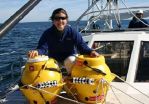(Press-News.org) EVANSTON, Ill. - Music training has well-known benefits for the developing brain, especially for at-risk children. But youngsters who sit passively in a music class may be missing out, according to new Northwestern University research.
In a study designed to test whether the level of engagement matters, researchers found that children who regularly attended music classes and actively participated showed larger improvements in how the brain processes speech and reading scores than their less-involved peers after two years.
The research, which appears online on Dec. 16 in the open-access journal Frontiers in Psychology, also showed that the neural benefits stemming from participation occurred in the same areas of the brain that are traditionally weak in children from disadvantaged backgrounds.
"Even in a group of highly motivated students, small variations in music engagement -- attendance and class participation -- predicted the strength of neural processing after music training," said study lead author Nina Kraus, the Hugh Knowles professor of communication sciences in the School of Communication and of neurobiology and physiology in the Weinberg College of Arts and Sciences at Northwestern.
The type of music class may also be important, the researchers found. The neural processing of students who played instruments in class improved more than the children who attended the music appreciation group, according to the study.
"Our results support the importance of active experience and meaningful engagement with sound to stimulate changes in the brain," said Kraus, director of Northwestern's Auditory Neuroscience Laboratory.
The data was collected as part of a multi-year collaboration with The Harmony Project, a non-profit that has provided music education and instruments to disadvantaged children in Los Angeles for more than a decade.
Rather than using an active control group, the researchers looked for differences within the group of children participating in Harmony Project classes.
Unlike most music studies, which often estimate brain activity using paper and pencil tests, Kraus directly assessed the brain by strategically placing electrode wires with button sensors on the students' heads to capture the brain's responses.
Northwestern and the Harmony Project joined forces several years ago after Harmony's founder, Margaret Martin, approached Kraus seeking scientific evidence behind the striking academic success of the students. Despite a dropout rate of 50 percent or more in their neighborhoods, 93 percent of Harmony Project seniors have gone on to college since 2008.
Previous Northwestern findings based on Harmony Project data have shown that two years of music training - but not one - improved the brains' ability to distinguish similar-sounding syllables, a skill linked to literacy.
"Music, then, can't be thought of as a quick fix," said Kraus.
That previous research, published in September in the Journal of Neuroscience, indicated that the community music program can literally 'remodel' a child's brain in a way that improves sound processing and was the first direct evidence that the music training has a biological effect on children's developing nervous systems.
Children from families of lower socioeconomic status process sound less efficiently, in part because of noisier environments and also due to linguistic deprivation -- or not hearing enough complex words, sentences and concepts. This puts them at increased risk of academic failure or dropping out of school, said Kraus.
"Think of 'neural noise' as like static on the radio, with the announcer's voice coming in faintly," said Kraus.
Music training may be one way to boost how the brain processes sound to remove the interference, said Kraus.
"Speech processing efficiency is closely linked to reading, since reading requires the ability to segment speech strings into individual sound units," said Kraus.
"A poor reader's brain often processes speech suboptimally."
"What we do and how we engage with sound has an effect on our nervous system," said Kraus. "Spending time learning to play a musical instrument can have a profound effect on how your nervous system works."
INFORMATION:
About Frontiers
Frontiers is a community-driven open-access publisher and research networking platform. Established by scientists in 2007, Frontiers drives innovations in peer-review, article level metrics, post publication review, democratic evaluation, research networking and a growing ecosystem of open-science tools. The "Frontiers in" journal series has published 25,000 peer-reviewed articles across 49 journals, which receive 6 million monthly views, and are supported by over 160,000 leading researchers worldwide. In 2014, Frontiers won the ALPSP Innovation in Publishing Award. For more information, visit: http://www.frontiersin.org
The study was funded by the National Association of Music Merchants (NAMM Foundation) and The GRAMMY Foundation. END
ANN ARBOR, Mich. -- For up to one in five Americans over age 65, getting older brings memory and thinking problems- along with the embarrassment of not being as "sharp" as they once were, and the worry that it will get much worse.
They might just call it "getting older". But officially, when memory or cognitive problems don't interfere significantly with daily living, doctors call them mild cognitive impairment, or MCI.
What can be done to prevent or slow MCI? And how much should seniors fear that their thinking or memory problems will get much worse? A pair of doctors ...
DALLAS - Dec. 16, 2014 - It's a sound that saves. A "real-time" radiation monitor that alerts by beeping in response to radiation exposure during cardiac-catheterization procedures significantly reduces the amount of exposure that medical workers receive, UT Southwestern Medical Center researchers found.
In a randomized study, the researchers divided 505 patients undergoing either diagnostic coronary angiography or percutaneous coronary intervention, such as stent placement, into two groups. In half the procedures, medical workers used the current gold standard for radiation ...
Boston, MA-- Nutrition experts are continually debating the nutritional value of carbohydrate-containing foods and whether some are healthier than others. High carbohydrate foods are classified by how much they increase blood sugar; known as glycemic index. In new findings led by researchers at Brigham and Women's Hospital (BWH) in Boston and Johns Hopkins University (JHU) in Baltimore, researchers looked at glycemic index' effect on cardiovascular disease (CVD) and diabetes and found that low glycemic diets did not improve insulin sensitivity or cardiovascular risk factors. ...
HOUSTON - (Dec. 16, 2014) - Rice University scientists have detected at least three instances of cross-species mating that likely influenced the evolutionary paths of "old world" mice, two in recent times and one in the distant past.
The researchers think these instances of introgressive hybridization -- a way for genetic material and, potentially, traits to be passed from one species to another through interspecific mating -- are only the first of many needles waiting to be found in a very large genetic haystack. While introgressive hybridization is thought to be common ...
By analyzing data on multilingual Twitter users and Wikipedia editors and on 30 years' worth of book translations in 150 countries, researchers at MIT, Harvard University, Northeastern University, and Aix Marseille University have developed network maps that they say represent the strength of the cultural connections between speakers of different languages.
This week, in the Proceedings of the National Academy of Sciences, they show that a language's centrality in their network -- as defined by both the number and the strength of its connections -- better predicts the ...
PRINCETON, N.J.--More than half of all American children will likely live with an unmarried mother at some point before they reach age 18, according to a report issued by Princeton University and Harvard University.
The absence of a biological father increases the likelihood that a child will exhibit antisocial behaviors like aggression, rule-breaking and delinquency, the researchers report in the journal EducationNext. This finding - which holds true regardless of a child's race - is especially prevalent among young boys. As a result, these children are 40 percent less ...
We humans have an exceptional age structure compared to other animals: Our children remain dependent on their parents for an unusually long period and our elderly live an extremely long time after they have stopped procreating.
Could the microscopic fellow travelers that consider the human body to be their home - collectively known as the microbiome - have played an active role in shaping and maintaining this unusual aspect of human nature?
That is the speculative proposition advanced by Martin Blaser, professor of medicine and microbiology at NYU's Langone Medical ...
Humpback whales have a trick or two, when it comes to finding a quick snack at the bottom of the ocean. But how they pinpoint that meal at night, with little or no available light, remains a mystery.
Susan Parks, assistant professor of Biology in Syracuse University's College of Arts and Sciences, in collaboration with a consortium of other researchers, has been studying these unique feeding behaviors. Her research emphasizes the importance of specific auditory cues that these mammoth creatures emit, as they search the deep ocean for their prey.
Her findings are the ...
Massachusetts General Hospital (MGH) investigators have developed a method of detecting, across the entire genome of human cells, unwanted DNA breaks induced by use of the popular gene-editing tools called CRISPR-Cas RNA-guided nucleases (RGNs). Members of the same team that first described these off-target effects in human cells describe their new platform, called Genome-wide Unbiased Indentification of DSBs Evaluated by Sequencing (GUIDE-seq), in a report being published online in Nature Biotechnology.
"GUIDE-seq is the first genome-wide method of sensitively detecting ...
ANN ARBOR--A national survey of students in U.S. middle schools and high schools shows some important improvements in levels of substance use.
Both alcohol and cigarette use in 2014 are at their lowest points since the study began in 1975. Use of a number of illicit drugs also show declines this year.
These findings come from the University of Michigan's Monitoring the Future study, which tracks trends in substance use among students in 8th, 10th and 12th grades. Each year the national study, now in its 40th year, surveys 40,000 to 50,000 students in about 400 secondary ...



